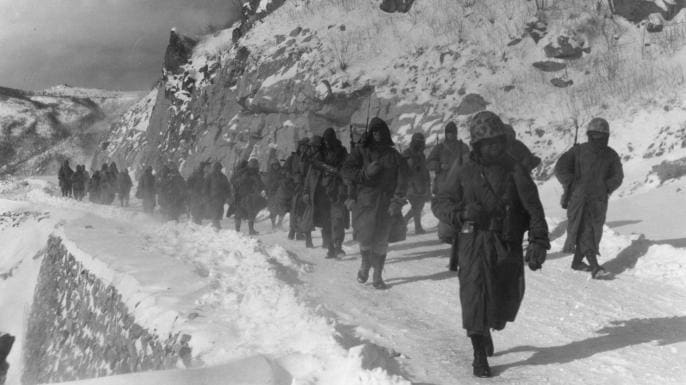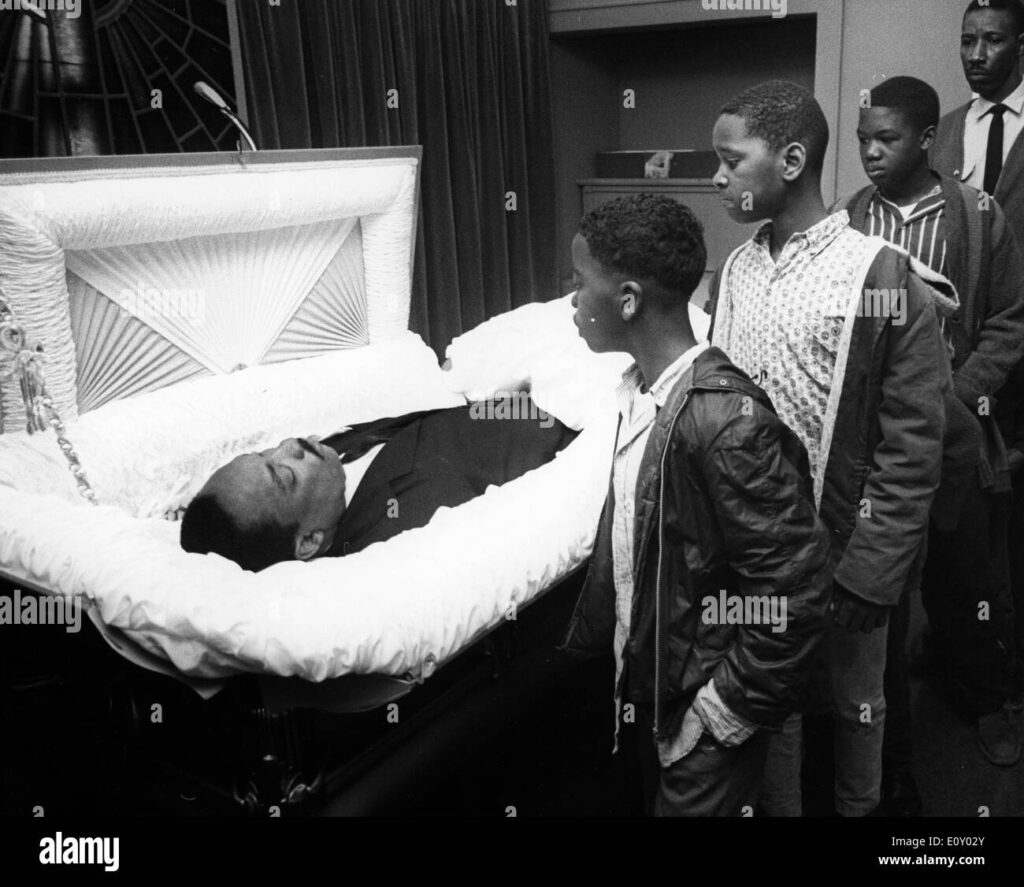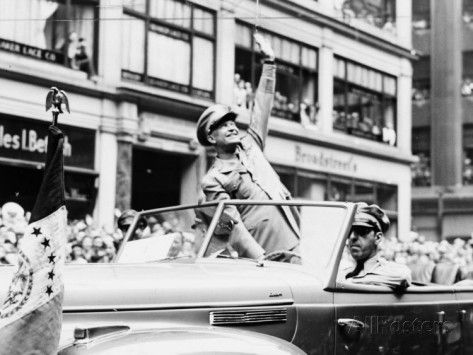(Updates and expansion of a previous article.)
The word on the street is that the Democrats are trying to regain their rep as warriors. If you attended school during the last half-century, you might not know that they ever were. Maybe you were taught that Republicans have always been the war-hawks, that Richard Nixon got us into Vietnam, and that every GOP president wants to drop the Bomb on somebody. You might have no idea that our involvement in World Wars I and II, as well as Korea and Vietnam, began when Democrats held the presidency.
World War I.
Woodrow Wilson was president when the Great War began, in August 1914. He kept us neutral, and ran for re-election in 1916 on the slogan “He kept us out of war.” But in 1917, when Germany resumed “unrestricted submarine warfare” (i.e., sinking enemy ships without warning), Mr. Wilson had to make good on his vow that we would fight if that mode of warfare recurred. Our commitment of 2 million troops to the Western Front tipped the balance against the Central Powers and allowed Britain, France, and their allies to prevail.
World War II.
President Franklin Roosevelt also kept the USA out of the war that started when Germany invaded Poland in September 1939. There was no perceptible support among the American people for our intervention, so we watched from the sidelines as Germany overran Europe and then launched a massive offensive against the Soviet Union in June 1941.
Only after Japanese carrier-forces destroyed much of our Pacific fleet in a surprise air raid on Pearl Harbor (December 7, 1941) did FDR have the political support he needed to declare war on Japan. FDR was a great friend of England and an implacable foe of the Nazis, but he dared not join the fight against Germany until after Adolph Hitler declared war on us. Teamed with the Soviet Union and England, our enormous economic, manufacturing and military strength produced the complete defeat of Germany, Italy, and Japan in 1945. Harry Truman became the only president to use atomic weapons when he authorized the A-bombing of Hiroshima and Nagasaki in August 1945.
Korea.
Mr. Truman was still president when North Korean forces invaded South Korea in June 1950. Under political pressure for being “soft on communism,” Mr. Truman ordered US forces to intervene. The USSR had veto-power in the United Nations Security Council, but their UN-representative was a no-show when the vote on Korean intervention was conducted. With General Douglas MacArthur in command, our troops reinforced South Korean armed forces. MacArthur’s brilliant amphibious landings at Incheon – in the rear of the enemy’s armies – drove North Korean forces back across the 38thparallel.
UN and South Korean forces were poised to invade North Korea when Communist China sent 300,000 fresh troops into the war. The communists recaptured Seoul and forced American forces to retreat into the southern part of South Korea. Between 27 November and 13 December 1950, 30,000 UN troops were encircled and attacked by 120,000 Chinese troops in the Battle of Chosin Reservoir. In a desperate combat effort UN forces broke out of the encirclement, inflicted heavy casualties on the Chinese, and succeeded in withdrawing to the port of Hungnam. That retreat, led by our 1st Marine Division in bitterly cold conditions, is considered one of the great feats of American military arms.

Korea was the first time in the 20th century when we went to war without being attacked by a foreign enemy. It was also the first time that our political and military leadership differed openly on the conduct of a war. (Arguably those two “firsts” were probably related.) General Mac wanted to interdict Chinese forces north of the Yalu River, but Mr. Truman opposed that move, fearing that it would precipitate our involvement in a general war in Asia. When the general publicly proposed using nuclear weapons on China, he was recalled by Mr. Truman in April 1951. Thereafter, the war devolved into a costly two-year stalemate.
MacArthur’s recall1 was the first news event I can clearly remember, although I didn’t comprehend its meaning at the time. (Everyone was singing “Old Soldiers Never Die.”) The general was a national hero who had whupped the Japanese in WWII, so his recall was a really big deal. But it won Mr. Truman no political points. Some historians believe it caused him not to seek re-election in 1952.
After his election in November 1952, Dwight Eisenhower exerted his influence on the Korean peace negotiations. Some historians say he threatened to use the atomic bomb unless North Korea came to terms, but this was not confirmed. An armistice ending the war was signed in June 1953.
Vietnam.
Contrary to a popular modern impression – especially among Americans born after 1960 – Richard Nixon did not get us into Vietnam. That honor is shared by Presidents Kennedy and Lyndon Johnson. Mr. Kennedy had been sending soldiers to assist South Vietnam military forces in a growing war against the Viet Cong. By late 1963 we had several thousand “advisors” in South Vietnam.
LBJ inherited the situation in “Veet-nam” after JFK’s death and used it to political advantage during the presidential campaign of 1964. Although voter-support for Senator Barry Goldwater, the GOP candidate, was only tepid, LBJ evidently felt that he needed an ace to push him over the top. The Bay of Tonkin incident filled the bill. A North Vietnamese PT boat’s alleged attack upon an American warship off the Vietnamese coast in August 1964 was LBJ’s excuse for involving us militarily in Vietnam. (Later investigations cast doubt on whether the event happened at all.)
Lacking the uniform, but otherwise in full commander-in-chief mode, LBJ defeated Mr. Goldwater with 63% of the popular vote. Then in March 1965 he called for 500,000 American troops to intervene in Vietnam. (As my colleagues and I listened to LBJ’s address on the radio, someone joked that we were lucky that Goldwater didn’t win, as he might have involved us in an Asian land war.) LBJ called for no actual declaration of war, nor did he worry about how the United Nations might view his actions.
Declaration or not, American forces made serious war and had thumped the Viet Cong by 1968. The Cong were on the ropes, so the Tet Offensive, in January ‘68, was their last ditch attempt to turn the war around. Although militarily disastrous for the Cong, Tet was wildly successful in political terms. It sparked protests across the USA and generated unhinged media claims that the war was lost.
Consequently, LBJ abandoned re-election plans, and Senator Robert Kennedy mounted a “peace candidacy” presidential run which ended with his assassination in June. Both Richard Nixon and VP Hubert Humphrey promised to end the war soon, but the divided Democrats lost to Mr. Nixon when segregationist George Wallace carried five states that Mr. Humphrey should have won.2
Vietnam also marked several firsts for the USA. It was our first 20th century war in which the media were adversarial parties instead of positive arms of our war effort. It also marked the first time since the Civil War when citizens engaged in widespread anti-war protests. Vietnam also ended “the loyal opposition” tradition for the Democratic Party – for good, as it seemed then.
I recall feeling that the country was out of control in the spring and early summer of 1968, as the murder of Mr. Kennedy followed closely upon the murder of Martin Luther King, Jr. Middle-class Americans where I lived wondered what would happen next.

It took Mr. Nixon four years to get us out of Vietnam, but by that time he owned the war. That LBJ had gotten us into it – possibly by a ruse – was (conveniently) forgotten. Mr. Nixon got the peaceniks’ full ire, and Democrats became the anti-war party. Thereafter, any war run by a Republican administration would get no support from Democrats.
Post-Vietnam Terrorism.
Democrats managed to elect Jimmy Carter (a peacenik in military drag) once, and Bill Clinton (a Hugh Heffner-wannabe who used the military for timely diversions) twice, but the jury is still out on the effectiveness of the anti-war strategy. Throughout American history, no president has ever been elected on a platform calling for us to abandon a war we have committed ourselves to.
Sensing disconnect with voters, fifteen House of Representatives Democrats crafted a document in 2005 defining a new strategy which they hoped would restore voters’ trust in their party on national security. Minority Whip Steny Hoyer captained production of “Ensuring America’s Strength and Security: A Democratic National Security Strategy for the 21st Century.” Said Mr. Hoyer: “If we don’t convince people that we are capable of defending the country, we’ll never get to other issues.”
The document produced by Mr. Hoyer’s group was a worthy effort. It contained some good ideas, including a “Manhattan Project” on hydrogen fuel research to make us independent of foreign oil. But Democrats’ “other issues” eventually grew to include: gay marriage; transgender operations on children; a secularized society; health care on the Canadian (socialist) model; opposing parental choice in public schools; higher taxes; more welfare; open borders; voting rights for illegal immigrants; and economy-wrecking hammer-blows to stop climate-change.
Inverted Unification Strategies.
As Joe Biden hunkered down in his basement to refashion himself as a new “mystery candidate,” that list of Democrat “other issues” was conveniently kept away from voters’ view. Good Old Joe promised to “unite the country” after what he call Donald Trump’s “ruinous tenure,” but voters who bought that line soon found out what it really meant.
Even Democrats can see that their party’s “program” is bankrupt. Voters do not want it, but this is only part of Dems’ problem. Voters don’t trust Democrats on national security because they can see that the party’s commitment to it arises only for political purposes.
Presidents Wilson and FDR were both elected in peacetime on social platforms. Each was re-elected by pledging neutrality in the war that began on his watch, and each had the nation’s trust and support when he was later forced to take us into war. The public’s trust started with their domestic agenda, and our trust for military intervention derived from that earlier trust.
Both Truman and LBJ became presidents via the deaths of their predecessors, and both experienced difficulties in their military interventions. Mr. Hoyer and his group tried to gain support by looking strong on national security, so they addressed that problematic aspect of their party. But they had the problem inverted. Instead of earning the nation’s trust on domestic policy, as Wilson and FDR had done, their party has allied itself with radical fringe groups that reject the values of the country’s central culture. This is why lifelong Democrats, like former Senator Zell Miller, have said they haven’t left the party. They claim it has left them.
Today, Democrats are attempting to force a radical social agenda on the American culture. But seeing that attempt failing, they are leaning toward involving us in a foreign war which has not touched us directly. Democrat strategists, including Joe Biden, are tempted to play The War Card to keep themselves in power. But, as LBJ could testify, it is a dangerous strategy.
The Democratic Party today is like a once-great football team trying to rebuild itself. Someone remembers that the great teams of yesteryear staged stylized end-zone celebrations after a score, so the current team spends a lot of time rehearsing those old celebratory moves to bring it back to greatness. But totally missing is a concentration on the excellent blocking, tackling, passing, running, and other truly decisive elements of play which made the old teams great. A bleak frustration sets in when the cosmetic measures fail to restore the team to its former glory.
No matter how many strategy papers on national defense a party writes, it cannot gain voters by being opposed to everything the opposition stands for, by being fundamentally at odds with the nation’s prevailing culture or, most ominously, by taking the country into a war to hold onto political power. The latter can lead to unpredictable disasters, and it must be resisted with stout hearts and clear minds. These are dangerous times, and there’s no room for error.
“For if the trumpet give an uncertain sound, who shall prepare himself to the battle?” (I Corinthians 14:8)
*********
- At the time of his recall in 1951, General MacArthur had not been in the continental USA for 14 years. His father, General Arthur MacArthur, served in the Union army during the Civil War, and became the military Governor-General of the American-occupied Philippines in 1900.
- Alabama Governor George Wallace, running on a segregationist platform, carried Georgia, Alabama, Mississippi, Louisiana and Arkansas in the 1968 election. Campaigning again for the presidency in 1972, Gov. Wallace was wounded and permanently disabled by an assassin at a rally in Laurel, Maryland.

